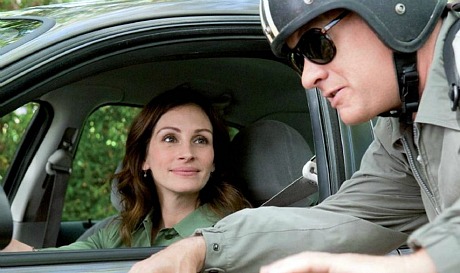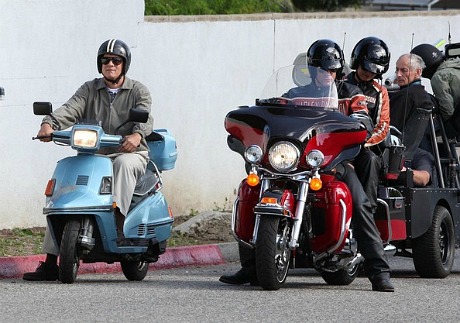Larry Crowne (Universal, 7.1) is a mild-mannered, lightweight, reality-skirting, cruise-along feel-good movie about a mild-mannered, trying-to-always-feel-good nice guy in his early 50s (Tom Hanks) who loses his job at Walmart…UMart, I mean, and has to find ways to live within new economic limits without getting angry or depressed or turning to drink or doing anything unattractive or unlikable, which, as we all know, is way outside Hanks’ wheelhouse.

So Mr. Crowne buys a scooter and decides to take some classes at a small community college and kinda gets going with a couple of women in a very mild sense, one a fellow student (Gugu Mbatha-Raw) and the other his public-speaking teacher (Julia Roberts), and starts to wear darker, cooler-looking threads and gets a nice hip haircut and regrettably sells his home and generally avoids anything that even remotely resembles that gnarly little bugger called “drama.”
Larry Crowne, in short, is about butter not melting in anyone’s mouth. Not in Hanks’, Roberts’ or Mbataha-Raw’s mouth…well, okay, maybe in Bryan Cranston‘s mouth because he’s playing another bothered guy (i.e, Roberts’ no-account husband) who has, in this instance, alcohol and big-boob issues. Otherwise the concept of butter melting under any circumstance is never considered in this thing, and I mean not even as a theory.
Larry Crowne is about being open and good-natured and saying “sure, I’ll try it” and “why not?’ and “today is the first day of the rest of my life” and all that. It almost gets there from time to time, but most of us go to a film like this expecting to absorb a kind of Jerry Maguire-like vibe, and this movie doesn’t want to know about even trying to be a Jerry Maguire for 45-and-olders. It doesn’t begin to compete with the emotionality of that 1996 Cameron Crowe film.
Larry Crowne is also self-portraiture. It’s a portrait of a moneyed, honeyed LA culture that doesn’t let anything in that’s bad or difficult or threatening. It’s about the mellow, gentle, agreeable, Playtoney, positive-minded liberal-affluent membrane that Hanks, the film’s star/director/co-writer, and Nia Vardolos, his co-writer, live in along with Hanks’ wife Rita Wilson and his various producers and enablers and all the others who helped Hanks make this little mind-fable flick.

I didn’t believe for a millisecond that in real life a woman as young and beautiful as Gugu Mbatha-Raw — easily the film’s biggest ray of sunlight — would even flirt with a nice schlub like Larry Crowne, an ex-Navy lifer who toiled as a cook for 20 years before getting hired by UMart. Women this hot never go to community colleges and buzz around on scooters with hot-headed Latino boyfriends (Wilmer Valderrama). They roll with the highest level of players — rich guys and artists and photographers and producers and artists and politicians. Mbatha-Raw’s character pays attention to Larry Crowne because Hanks hired her to do this — end of story.
I’ve seen mild-mannered French movies like this. A middle-aged guy suffers a downturn of some kind, and then quietly rebounds and starts putting it all back together and keeps his sense of humor and even gets lucky with a pretty girl or two. It would probably feel a little more charming if it had been made in France and…you know, spoken in French with English subtitles and all that.
I wasn’t twitching in my seat as I watched Larry Crowne. I wasn’t convulsing with pain. I was just like….oh, okay, I get it, fine…Tom Hanks really needs to be liked and likable and that’s why this movie is the way it is.
Larry Crowne is about telling nice lies that aren’t entirely lies because they’re pleasant and friendly and nice to think about, and about showing us a world that doesn’t really exist except in Tom Hanks’ and Nia Vardalos’ head.
There isn’t a single moment in Larry Crowne, which is fundamentally about dealing with a lack of money and security, that delivers the kind of resonance contained in this lyric from Randy Newman‘s “It’s Money That I Love”:
“They say that money / Can’t buy love in this world / But it’ll get you a half-pound of cocaine / And a sixteen-year old girl / And a great big long limousine / On a hot September night / Now that may not be love / But it is all right.”
Not very likable, but obviously reflective of the world out there and the way people really are.
